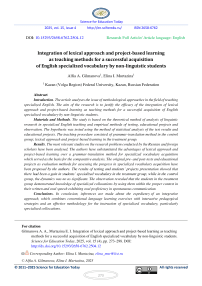Integration of lexical approach and project-based learning as teaching methods for a successful acquisition of English specialized vocabulary by non-linguistic students
Автор: Gilmanova A.A., Murtazina E.I.
Журнал: Science for Education Today @sciforedu
Рубрика: Филология и культура для образования
Статья в выпуске: 4 т.15, 2025 года.
Бесплатный доступ
Introduction. The article analyses the issue of methodological approaches in the field of teaching specialized English. The aim of the research is to justify the efficacy of the integration of lexical approach and project-based learning as teaching methods for a successful acquisition of English specialized vocabulary by non-linguistic students. Materials and Methods. The study is based on the theoretical method of analysis of linguistic research in specialized English teaching and empirical methods of testing, educational projects and observation. The hypothesis was tested using the method of statistical analysis of the test results and educational projects. The teaching procedure consisted of grammar-translation method in the control group; lexical approach and project-based learning in the treatment group. Results. The most relevant studies on the research problem conducted by the Russian and foreign scholars have been analysed. The authors have substantiated the advantages of lexical approach and project-based learning over a grammar-translation method for specialized vocabulary acquisition which served as the basis for the comparative analysis. The original pre- and post-tests and educational projects as evaluation methods for assessing the progress in specialized vocabulary acquisition have been proposed by the authors. The results of testing and students’ projects presentation showed that there had been a gain in students’ specialized vocabulary in the treatment group, while in the control group, the dynamics was no as significant. The observation revealed that the students in the treatment group demonstrated knowledge of specialized collocations by using them within the proper context in their written and oral speech exhibiting oral proficiency in spontaneous communication. Conclusions. In conclusion, inferences are made about the expediency of an integrative approach, which combines conventional language learning exercises with interactive pedagogical strategies and an effective methodology for the instruction of specialized vocabulary, particularly specialized collocations.
Lexical approach, Project-based learning, Non-linguistic students, Specialized English, Grammar-translation Method, Specialized collocations, Oral proficiency
Короткий адрес: https://sciup.org/147251608
IDR: 147251608 | УДК: 372.8+811.111+316.77 | DOI: 10.15293/2658-6762.2504.12


